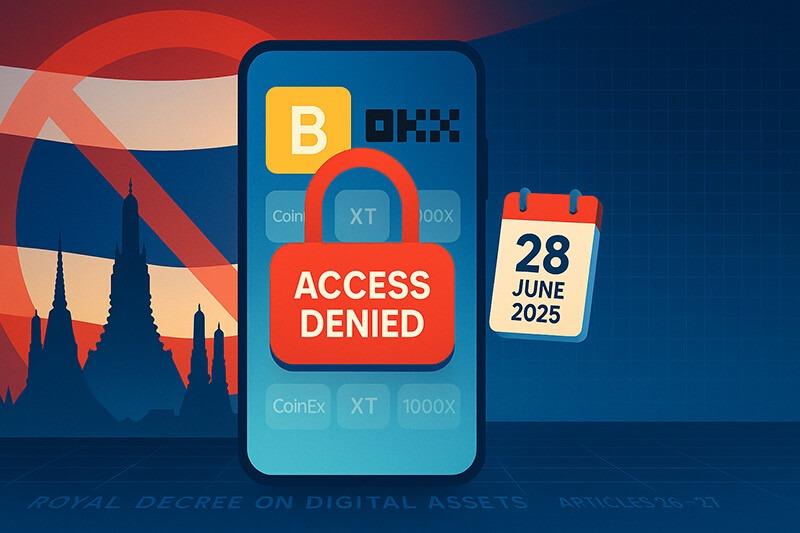Will Thailand obstruct Bybit and OKX trading on June 28?
Thailand’s financial regulators have moved to block 5 cryptocurrency exchanges from operating in the country. This action follows updates to local laws focused on technology crime prevention. The affected platforms include Bybit, OKX, CoinEx, XT.COM, and 1000X. Authorities state the decision is based on the lack of proper licenses required for legal operation in Thailand.
Thailand blocks Bybit, OKX, CoinEx, XT.COM, 1000X on 28 June. Action implements new cyber-crime decree for unlicensed exchanges. Users recommended to withdraw assets before access ends.
Thailand’s monetary regulators have moved to block five cryptocurrency exchanges from operating in the country. This action follows updates to local laws focused on technology crime prevention. The affected platforms include Bybit, OKX, CoinEx, XT.COM, and 1000X. Authorities state the decision is based on the absence of appropriate licenses required for legal operation in Thailand. Investors using these services have been advised to take action before access is restricted. The changes are part of a broader strategy to digital asset regulation in the country.
Regulatory Trigger: Royal Decree on Digital Assets (13 April 2025)
In Thailand, a Royal Decree aimed at preventing technology crimes took effect on 13 April, granting the Ministry of Digital Economy and Society (MDES) legal authority to disable unlicensed digital-asset venues. This decree supplements the 2018 Digital Asset Organization Law by introducing faster takedown procedures that do not require lengthy court orders once the SEC submits a complaint.
Thailand SEC Orders 5 Exchanges to Stop Operations
After investigating the five platforms, regulators concluded that each had been matching trades for domestic clients without a local license. Complaints lodged with MDES cite specific breaches of Articles 26 and 27 of the Digital Asset Organization Law. MDES is therefore expected to direct internet service providers to block the relevant domains and mobile applications starting 28 June 2025.
Implications for Investors and Market Participants
Clients using the affected services should transfer tokens or fiat balances to approved locations or personal wallets before the cutoff date. Balances left in place may become inaccessible when geolocation and IP filters tighten. The SEC has warned that users transacting on unregistered exchanges are not eligible for statutory protections covering fraud, system failures, or insolvency.
Exchange Reactions and Contingency Plans
Bybit has stated it is “committed to operating with transparency” and is seeking information from authorities, while OKX has not yet commented publicly. Internal compliance teams at multiple firms are reviewing options that range from seeking a local broker-dealer license to halting new account creation and winding down ongoing traffic with selective withdrawals.
Thailand Digital Asset Framework: Licenses and Enforcement
Obtaining a full exchange license in Thailand requires paid-up capital of at least THB 50 million, robust custody controls, quarterly audits, and a local compliance officer. Since 2019, the SEC has granted sixteen licenses but has also issued over forty warning letters to overseas sites. The latest crackdown is the first to utilize the rapid-response powers granted in April, signaling tighter daily monitoring.
Thailand Crypto Adoption Initiatives Beyond Enforcement
Policy makers continue to explore mainstream uses of distributed-ledger technology. Draft regulations released in May would allow travelers to spend crypto through credit-card-linked gateways, facilitating retail conversion. Separately, the Ministry of Finance aims to raise approximately USD 150 million in blockchain-recorded investment tokens, bringing retail savers into short-term government debt markets. Earlier, regulators approved USDt and USDC trading pairs on licensed exchanges, expanding stablecoin liquidity.
International Context and Comparisons
Regional counterparts like Singapore and Hong Kong operate tiered licensing regimes but rarely impose outright blocks; they instead rely on advertising bans and local bank controls. By contrast, India levies a high withholding tax on every crypto sale, while Indonesia plans a state-run futures clearing house for digital assets. Market participants view the Thai approach as a benchmark for balancing consumer protections with innovation incentives across Southeast Asia.
Conclusion
The closure order against Bybit, 1000X, CoinEx, OKX, and XT.COM underscores the SEC’s determination to enforce the April cyber-crime decree promptly. Investors must act before 28 June 2025 to safeguard funds, and exchanges face a choice between licensing and exit. Simultaneously, officials are advancing stablecoin listings, traveler payment pilots, and blockchain-bond issuance, reflecting a regulatory stance that integrates strict enforcement with regulated innovation.
Disclaimer: The information provided in this article is for educational purposes only and should not be considered financial advice. The content is the opinion of the author and does not reflect any view or recommendation from CryptoNewsBytes.com. The author states he does not hold any of the mentioned tokens or received any reward from any company.


